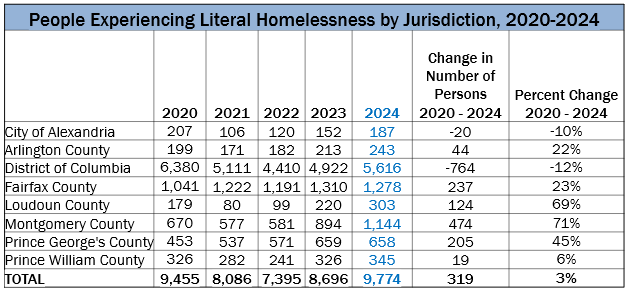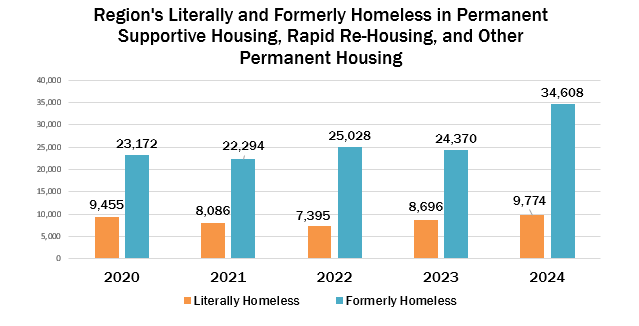A total of 9,774 people are experiencing homelessness in the region in 2024, according to a report by the Metropolitan Washington Council of Governments (COG) highlighting results from the annual Point-in-Time (PIT) count conducted by area jurisdictions and homeless services providers in January 2024. This is a twelve percent increase, or an additional 1,078 people experiencing homelessness, over the 2023 enumeration.
Seven out of the eight participating jurisdictions recorded an increase in persons experiencing homelessness between 2023 and 2024. This is the second year in a row that the count has increased, following a historic low in 2022.

As COVID-era housing protections (such as eviction moratoriums and emergency rental assistance supported by federal pandemic relief funding) have ended, the amount of people experiencing homelessness in the region has risen. This year’s count shows a three percent increase over 2020’s count, the first time the population of people experiencing homelessness in the region has surpassed pre-pandemic levels.
The region’s Continua of Care (CoCs) have made significant strides in programs to transition people experiencing chronic homelessness into permanent housing solutions. Locally, shelter diversion and homelessness prevention programs continue to grow, and since 2020, the total number of persons who are permanently housed and no longer experiencing homelessness in the region has increased by 57 percent.
“We have seen steady progress in housing support services that transition our residents experiencing homelessness into safe, affordable, permanent housing. But the need in our communities is great, and only with substantial and sustained investments into these programs will our region effectively make the experience of homelessness brief, rare, and non-recurring,” said Rodney Lusk, Chair of the COG Human Services Policy Committee and Fairfax County Board Member.

The number of individuals served by rapid re-housing, supportive housing, and other permanent housing solutions reached an all-time high in 2024. These efforts have helped constrain the incidences of homelessness in the region. Still, the limited supply of affordable housing opportunities for the region’s lowest-income households means more people require housing assistance.
COG and the region’s CoCs also continue to track and respond to the growing number of elderly adults experiencing homelessness in the region. The greatest share of single adults experiencing homelessness are above the age of 55. On the evening of the 2024 count, two individuals over the age of 90 were housed in emergency shelters. Older adults experiencing homelessness often face additional vulnerabilities due to medical and/or mobility challenges. Nationally, older adults are the fastest-growing age group experiencing homelessness, comprising nearly half of all unhoused people. As the region’s population ages, providers will likely need to adjust and re-evaluate services to better meet the needs of older adults.
The PIT count provides a one-day “snapshot” of individuals in the region who are: unsheltered and living on the streets, including parks, alleys, and camp sites; staying in an emergency hypothermia shelter or safe haven; living in transitional housing where they receive supportive services designed to help them move into some form of permanent housing; and those no longer experiencing homelessness and are now living in permanent supportive housing or other permanent housing.
This is the 24th consecutive year that COG has published its report to provide information on the scope and circumstances of homelessness in the region as well as the long-term impact of housing programs and services. Area jurisdictions connect regularly through COG to share strategies and coordinate their responses to homelessness. Data from the City and County of Frederick are not included in the 2024 analysis due to their merger with the Maryland Balance of State Continuum of Care in 2023. Frederick’s results will be published by the state of Maryland.
MORE: Homelessness in Metropolitan Washington